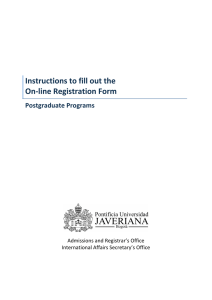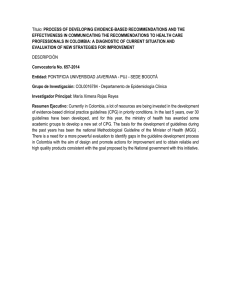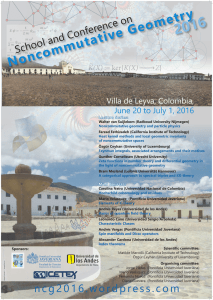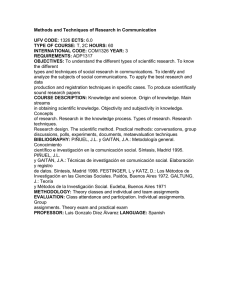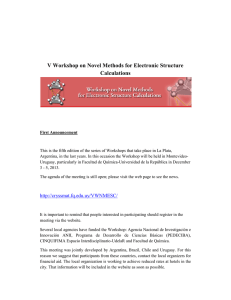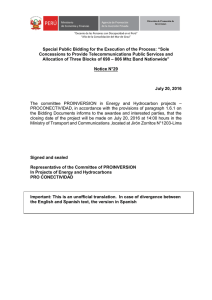Research Vice-Rectory - Pontificia Universidad Javeriana
Anuncio
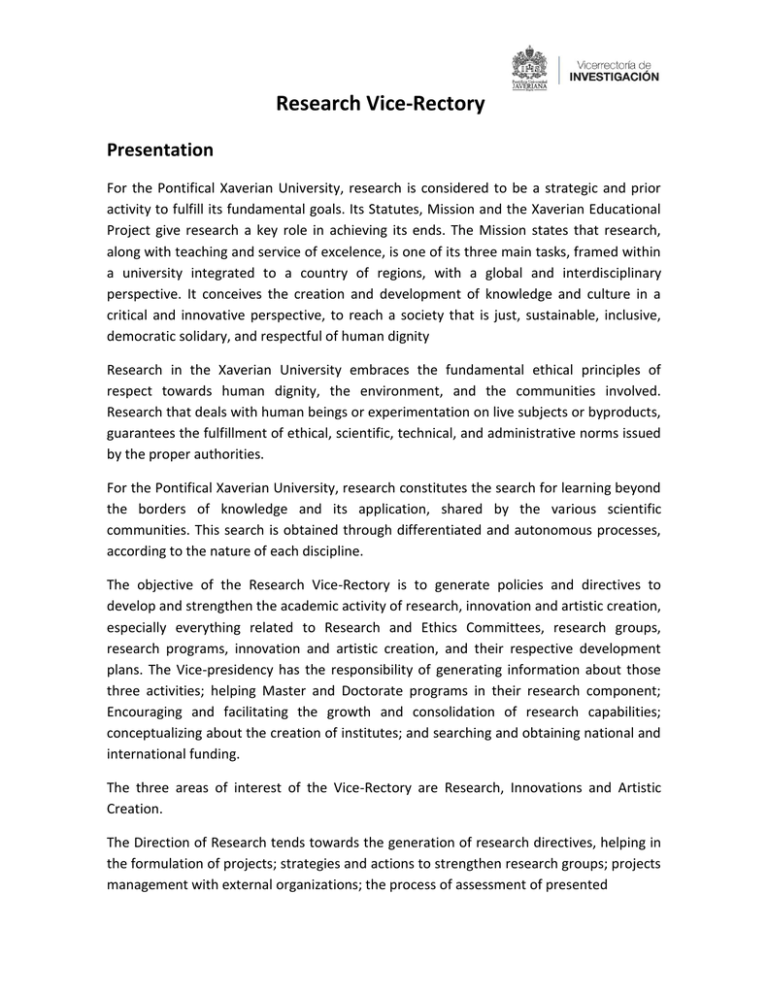
Research Vice-Rectory Presentation For the Pontifical Xaverian University, research is considered to be a strategic and prior activity to fulfill its fundamental goals. Its Statutes, Mission and the Xaverian Educational Project give research a key role in achieving its ends. The Mission states that research, along with teaching and service of excelence, is one of its three main tasks, framed within a university integrated to a country of regions, with a global and interdisciplinary perspective. It conceives the creation and development of knowledge and culture in a critical and innovative perspective, to reach a society that is just, sustainable, inclusive, democratic solidary, and respectful of human dignity Research in the Xaverian University embraces the fundamental ethical principles of respect towards human dignity, the environment, and the communities involved. Research that deals with human beings or experimentation on live subjects or byproducts, guarantees the fulfillment of ethical, scientific, technical, and administrative norms issued by the proper authorities. For the Pontifical Xaverian University, research constitutes the search for learning beyond the borders of knowledge and its application, shared by the various scientific communities. This search is obtained through differentiated and autonomous processes, according to the nature of each discipline. The objective of the Research Vice-Rectory is to generate policies and directives to develop and strengthen the academic activity of research, innovation and artistic creation, especially everything related to Research and Ethics Committees, research groups, research programs, innovation and artistic creation, and their respective development plans. The Vice-presidency has the responsibility of generating information about those three activities; helping Master and Doctorate programs in their research component; Encouraging and facilitating the growth and consolidation of research capabilities; conceptualizing about the creation of institutes; and searching and obtaining national and international funding. The three areas of interest of the Vice-Rectory are Research, Innovations and Artistic Creation. The Direction of Research tends towards the generation of research directives, helping in the formulation of projects; strategies and actions to strengthen research groups; projects management with external organizations; the process of assessment of presented proposals for their funding; promoting and spreading knowledge generated during research; and monitoring the research activity. The Direction of Research promotes activities that encourage innovation; entrepreneurship and transference of knowledge and technology created in the university; driving a culture aimed at innovation, support, protection and commercialization of knowledge generated in activities of research and innovation; and the management of intellectual property from the produced knowledge and technology. The Assistance of Artistic Creation stimulates the development of proposals of policies, strategies and directives to develop, promote, and socialize the artistic creation in the University; institutional mechanisms to characterize and assess artistic projects and works of artistic creations are also promoted; relationships of cooperation with institutions and organizations that promote such creation are generated as well as the activation of links with the art industry and cultural entrepreneurship. Research Vice-Rector PhD. Luis Miguel Renjifo Martínez Biologist, Master in Conservation Biology and Tropical Ecology and PhD in Ecology, Evolution and Systematics. He was Academic Dean of the School of Environmental and Rural Studies and recently Director of the Master in Conservation and Use of the Diversity, both of the Pontificia Universidad Javeriana. He was also program coordinator Conservation Biology Alexander Von Humboldt Institute, a professor at the National University of Colombia and the University of Missouri St. Louis, in the United States. Member of the Academia Colombiana de Ciencias Exactas, Físicas y Naturales, and was elected Ornithologist year during the National Ornithological Meeting in 2009 and Rodrigo Velez Bedout Award. Thematic areas of research: Effects of anthropogenic habitat conversion on biodiversity; Development of strategies for biodiversity conservation in rural landscapes and landscapes unprocessed, and Assessment of risk of extinction of species. Organization Chart Research Vice-Presidency “Pensar” Institute Bioethical Institute Assistance for Artistic Creation Public Health Institute Direction of Research Direction of Innovation Staff The Vice-presidency has three areas to encourage, promote and support research in the University: Direction of Research, Direction of Innovation and Assistance for Artistic CreationAsistencia para la Creación Artística. NAME DIRECTION E-mail Luis Miguel Renjifo Vicerrector de Investigación [email protected] Fanny Almario Directora de Innovación [email protected] Daniel Castillo Director de Investigación [email protected] Óscar Hernández Asistente de Creación Artística [email protected] Norma Moreno Dirección de Innovación [email protected] Sergio Cuéllar Dirección de Innovación [email protected] Daniela Triana Dirección de Innovación [email protected] Adriana Peñaranda Dirección de Innovación [email protected] Víctor José Aragón Dirección de Innovación [email protected] Helena Jiménez Dirección de Innovación [email protected] Liliana Echeverry Dirección de Investigación [email protected] José Joaquín Parrado Dirección de Investigación [email protected] Diana Usgame Dirección de Investigación [email protected] Carla Ramírez Dirección de Investigación [email protected] Rocío Puentes Dirección de Investigación [email protected] Kewin Cárdenas Dirección de Investigación [email protected] Diana Gutiérrez Dirección de Investigación [email protected] Ginna Gómez Dirección de Innovación [email protected] Juan Carlos Cobo Vicerrectoría de Investigación [email protected] Alexandra Rodríguez Vicerrectoría de Investigación [email protected] Claudia Marcela Mejía Vicerrectoría de Investigación [email protected]

